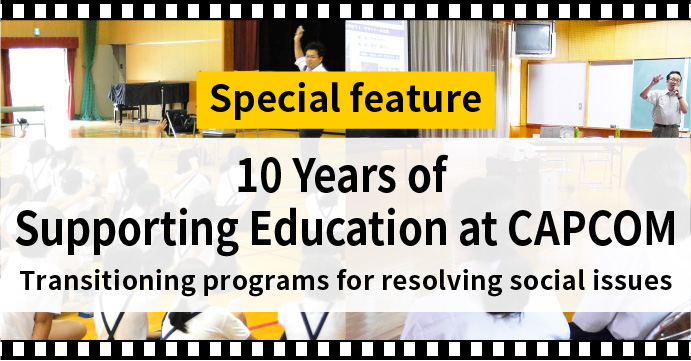Educational Support Activities | Our Goal / Upcoming Challenges
- Program Content
- Our Goal/
Upcoming Challenges - Efforts by Game Industry
for Better Understanding
Our Goal/Upcoming Challenges

Capcom has distributed a wide variety of games in order to provide not only entertainment but also a source of hope, dreams, inspiration, and experience, along with a means of communication for children. As a developer of game software, we strongly sense our responsibility to assist in educating children and to support the educational activities of teachers and parents.
We hope that our new educational program will become a connection between children, teachers, parents, and us. Capcom would like to fulfill a corporate social responsibility (CSR) by offering this program.
Although Capcom is not an expert in education, we try to promote activities that are beneficial to society. We would like you to know how grateful we are for your guidance and cooperation.

Background of Developing the Educational Program
Starting with the Family Computer (NES) released in 1983, the spreading of home video game consoles changed the lifestyle of children drastically. Today, most families have video game consoles.
We know that “play” is an important part of a child’s growth and development. However, an increase in “solitary play” time and “excessive concentration” might cause negative effects on children. If video games encourage “solitary play” or “excessive concentration” and thus interfere with a child’s healthy growth and communication ability, our intention went the wrong way.
Recently, “career education” is popular in schools, including elementary, junior high, and high schools, to develop a children’s job consciousness. As a part of being a “corporate citizen”, Capcom would like to take up the responsibility of being a company engaged in the game industry that also offers educational programs such as “company visits” and “on-site classes”, to meet requests from schools.
In the program, we explain what jobs are in game companies and introduce “career education” in which diversity, satisfaction, challenges, and importance as relating to employment are explained. The program also explains “how to deal with video games”. To help children understand the proper usage of video games, we hope that children can acquire knowledge and ability to have healthy relationships with such games. Capcom would like to keep offering such “learning opportunities”. We hope that our activities will make not only teachers and parents but also people all throughout society understand such video games and the efforts by the video game industry.
As a member of the game industry, Capcom realizes its corporate responsibility. By appropriately responding to educational issues, we would like to fulfill our corporate social responsibility (CSR). We accept “company visits” and have developed an educational program for “on-site classes”. Capcom hopes that our programs will be beneficial for both educational activities and family life.
Upcoming Challenges
2015 marks the 11th year since Capcom launched education support activities in 2005.
Initially, on-site classes were conducted at elementary and middle schools. At present, we are expanding the scope of on-site class activities to organizations other than educational institutions, including reform schools, temporary housing in disaster-stricken areas and regional municipalities.
However, compared to 10 years ago when these activities began, the environment surrounding children is undergoing tremendous change. This means the appeal of games and the way people interact with games are also changing. Thus, to continue using games to communicate the importance of work and the proper way to interact with games, Capcom will promote activities enabling an even greater response to educational needs based on advice from university education specialists as well as feedback from schools.




